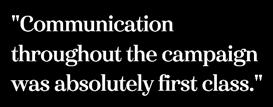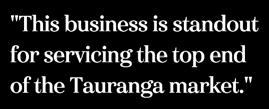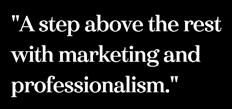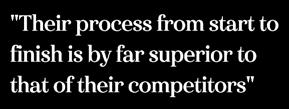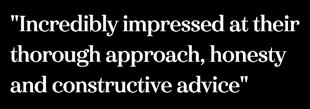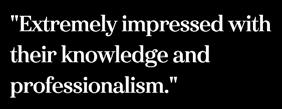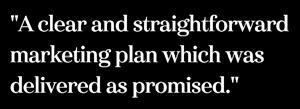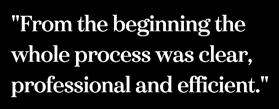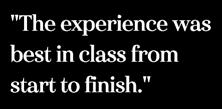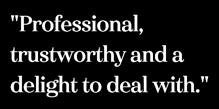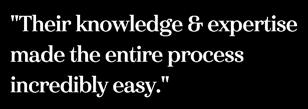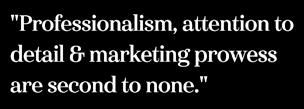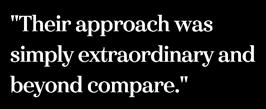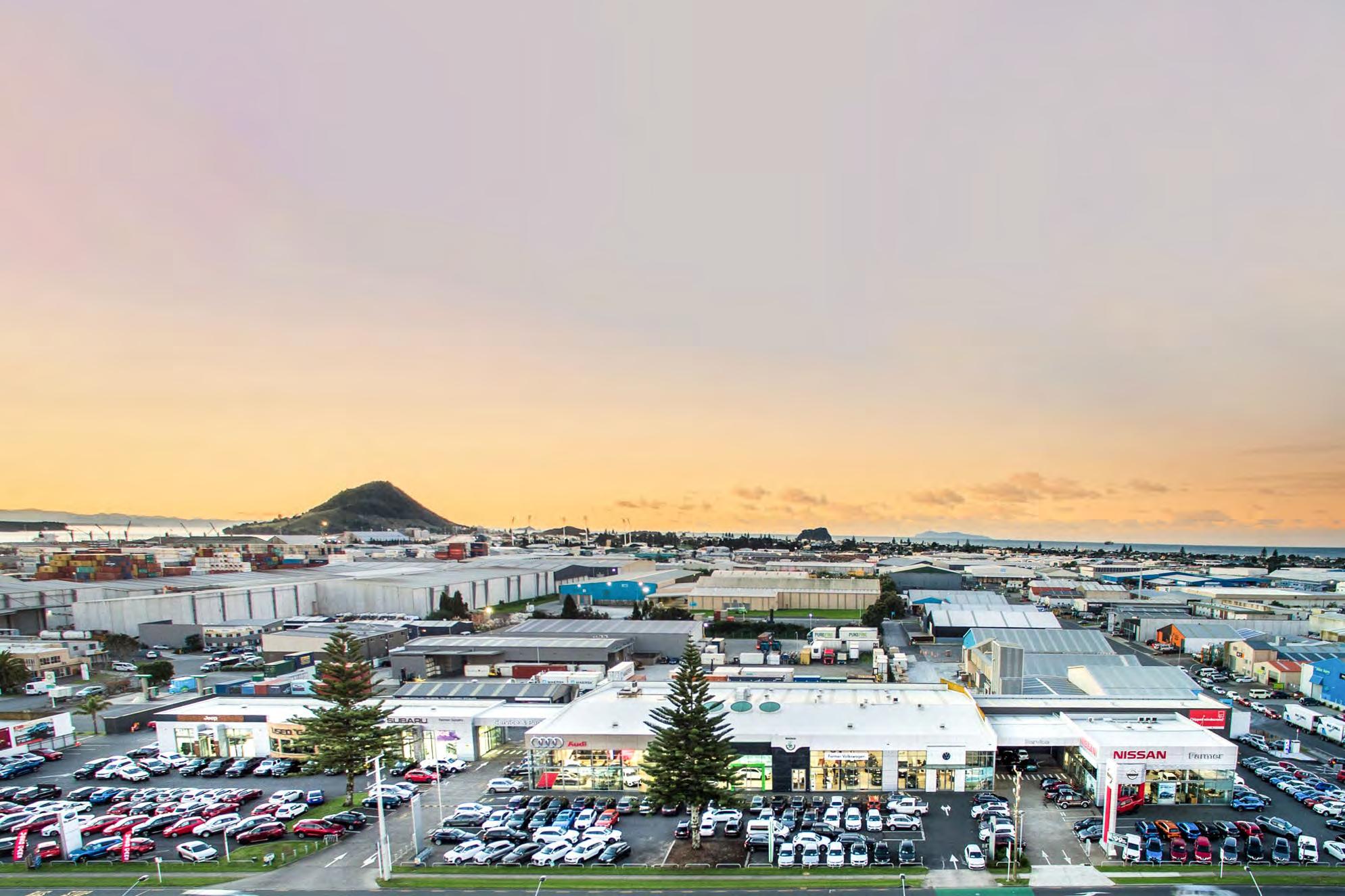

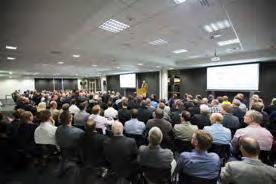


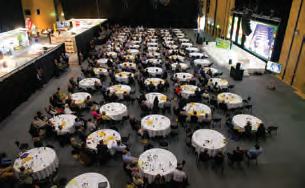





















































































































Whakatane’s ambitious project to create a new boat harbour on the Whakatane River has been advancing its investigative works in preparation for filing its resource consent application in the next month or so.
By DAVID PORTER
Despite the elimination from parliament of Shane Jones, his leader Winston Peters and their party at the last election, the party’s Provincial Growth Fund commitment under the name of the new government entity known as Kānoa continues as a partner with Council and local iwi to fund what will likely become the first iwi/Māori owned marina facility in New Zealand.
Phil Wardale, who was responsible for pulling together Tauranga’s Marine Precinct, took up the Project Director’s role in Whakatane with his team to advise and deliver the project.
The yet-to-be-named Boat Harbour will be located adjacent to the river, on 10 ha of Māori owned land that has been unproductive for decades. Bay of Plenty Business News profiled the project in the July/August issue.
“The aim was to deliver more commercial berthage, and other much needed marine infrastructure,” Wardale told BOP Business News.
Maori land contribution
“When we first got involved, the idea was to try and get more berths along-
side the river in town. But we ended up identifying a much larger plot of Māori land up the river.”
Of the funding, $19.6 million has been provided by the Provincial Growth Fund for the build of the boat harbour, and $9.8 million is being contributed by Whakatane District Council. Wardale described the project as a “transformational partnership” between the Te Rāhui Lands Trust, the Crown, Ngāti Awa Group Holdings Limited, and the Whakatāne District Council. There are currently more than 1000 beneficial owners of the Māori land block.
Wardale told BOP Business News that the project partners had yet to announce the name of the Boat Harbour, or the final makeup of the transformation partnership, which is scheduled to be announced during community conversations ahead of the filing of the resource consent application in October.
“The first big task is to secure the resource consent for the development and we have been underway with the investigative works and drafting of the consent application for all of 2021, and once the partnership is formally announced we will file the application.”

Wardale, who has been trapped in Auckland while the latest lockdown was on, noted that even in his original programme he had not been expecting major construction works would commence before the end of 2021.
He said he looked forward to returning to Whakatane and engaging with the community on the final plans ahead of starting the process to source and select the civil works contractor to build the $25 million project.
“Government and its many regional and national agencies have
been very supportive to date,” he said, adding that usually when government commits to contribute to something there weren’t too many holdups.
Wardale told BOP Business News previously that the new boat harbour would provide commercial boat operators and boat builders such as Extreme Boats on the East Coast with access to new facilities and new modern out of river berths, while increasing economic returns and providing opportunities for the local community.
The Provincial Growth Fund had
been all about helping regions grow, and this was a perfect example he said.
Wardale said his company and team was busy across the country despite the lockdowns, with a large project in Wellington, two projects in Nelson and a PGF project in Wanganui that was similar in size and complexity to Whakatane.
“We’re not sitting on our hands and are busy working with local government to plan or deliver new waterfront infrastructure in several towns and cities across the country.”


www.bopbusinessnews.co.nz
PUBLISHER
Alan Neben
Ph: 021 733 536
Email: alan@bopbusinessnews.co.nz
EDITOR
David Porter
Mob: 021 884 858
Email: david@bopbusinessnews.co.nz
PRODUCTION
Copy/Proofs/Graphic Design
Times Media – Clare McGillivray
Ph: (09) 271 8067
Email: clare@times.co.nz
ADVERTISING INQUIRIES
BUSINESS DIRECTOR
Pete Wales
Mob: 022 495 9248
Email: pete@bopbusinessnews.co.nz
ELECTRONIC FORWARDING
EDITORIAL:
News releases/Photos/Letters: david@bopbusinessnews.co.nz
GENERAL INQUIRIES: info@bopbusinessnews.co.nz
Bay of Plenty Business News has a circulation of 8000, distributed throughout Bay of Plenty between Waihi and Opotiki including Rotorua and Taupo, and to a subscription base. www.bopbusinessnews.co.nz
Bay of Plenty Business Publications
309/424 Maunganui Road, Mount Maunganui, 3116
Bay of Plenty Business Publications specialises in business publishing, advertising, design and print media services.
The current furore over our neighbour’s decision to opt for USbacked technology for its new submarine fleet has brought to mind how lucky in some ways we are in New Zealand.
For many of the journalists who reported on David Lange’s final trip though Asia back in the day, there was always a suspicion that, although he was a very bright and often extremely funny man who spent one third of his life in parliament, politics did not always seem at the front of his mind.
Notwithstanding that, former Labour leader Helen Clark has praised his success in helping create a nuclear-free New Zealand. And that status has to some extent isolated New Zealand from major fallout from the current wrangle between France and Australia.
The Australia, New Zealand, US Security Treaty (ANZUS) is the 1951 military agreement on the Pacific Ocean region. It provides that an armed attack on any of the three parties would be dangerous to the others.
New Zealand was suspended from ANZUS in 1986 when it initiated a nuclear-free zone in its territorial waters during Lange’s term.
We eventually lifted a ban on visits by US warships in 2012, leading to a thawing in tensions, but New Zealand remains partly suspended from ANZUS, especially since the US maintains an ambiguous policy on whether or not
its warships are nuclear.
However, ANZUS has been overshadowed by AUKUS, a trilateral pact between Australia, the UK and US. And, contributing to the current furore, it involves cooperation in nuclear submarines, which is for New Zealand, a no-go area.
As we know, China is New Zealand’s biggest global trading partner. But sometimes little appreciated is the fact that the Asian giant– which undoubtedly has expansionist aspirations in the Asia Pacific – is also Australia’s biggest trading partner in terms of both imports and exports.
Australia is China’s sixth-largest trading partner; it is China’s fifth-biggest supplier of imports and its 10-biggest customer for exports, according to recent reports. Twenty-five per cent of Australia’s manufactured imports come from China; 13 percent of its exports are thermal coal to China.
And as Geoffrey Miller, an international analyst at the Democracy Project in New Zealand, recently put it: Australia and New Zealand, “are poles apart in terms of the way they see the world... I think
this alliance underlines that they’re going in very different directions”.
For despite France’s wailing and recalling of ambassadors in protest, and its calls for compensation, the reality is that Australia has been trying to ease its way out of its French diesel submarine deal for some time because of cost blowouts and delays.
As US site Politico put it recently, although French Foreign minister Jean-Yves Le Drian has described the called-off estimated $50 billion-plus deal “a stab in the back”, they could have seen it coming.
Canberra signalled in June it was looking for a way out of the contract, signed in 2016 with French company DCNS (now known as Naval Group) to build Barracuda diesel submarines.
Australia’s Defense Secretary Greg Moriarty said: “It became clear to me we were having challenges ... over the last 15 to 12 months.”
He said his government had been considering its options, including what it could do if it was “unable to proceed” with the French deal.
Trouble began brewing almost immediately after Canberra chose the French bid ahead of alternate designs from Germany and Japan in

Councils now own drinking water, wastewater and stormwater assets, directly or indirectly. That will change. Only iwi/Maori will have ownership rights. Directly in some respects, indirectly in others. Local authorities will have none.” – Mike Judd, QC
Three Waters – ideological government indulging sectional political constituency – p18

April 2016, according to Politico, when DCNS admitted it had been hacked. Australia urgently needs the subs to replace some of its own aging fleet, but realised they were unlikely to be ready in time.
And a promise of thousands of Australian jobs and a boon for local industry has also faded.
What seems clear is that, while France is directing its public ire at Australia, it is probably even more aggrieved at the US.
Canberra has loudly maintained that it has previously communicated their issues about the French vessels.
China’s Asia Pacific neighbours have been vociferous in complaining about the mainland’s tendency to extend its reach ever-further into their territory.
What remains unclear is just how China will respond to Australia’s latest nuclear move.
The Government’s Three Waters Reform proposal aims to ensure that all New Zealand communities have safe and sustainable drinking water supplies, wastewater reticulation, treatment and disposal systems and stormwater services.” – Anne Tolley, Tauranga Commission chair
Commissioners’
Three Waters reform proposal – p15


Investment market update (for the quarter ended 31 August, 2021)
The majority of global share markets have continued to climb higher, with many sitting at or near record highs. Markets have been driven higher by a combination of:
• Companies generally delivering better-than-expected earnings results benefiting from a combination of improving economic activity and significant cost savings.
• Central banks and governments remaining committed to “loose” policy settings, including ultra-low interest rates, which continue to underpin very healthy growth in economic activity, and support demand for higher risk-return investments such as stocks.
• Vaccine roll-outs in Europe and the United States boosting hopes that rising cases of the Covid-19 delta variant will not lead to further lockdowns. Vaccines have proved effective in substantially reducing the proportion of people who catch the virus getting seriously ill.
New Zealand market bounces despite Covid lockdowns
Some may be surprised the strong performance has come at a time when we’ve been hit with the first Covid-19 community outbreak in six months, and the whole country has been thrown back into lockdown. Lockdowns will impact economically exposed sectors and companies.
The good news for investors, however, is the New Zealand market is dominated by defensive companies in sectors like healthcare, utilities, telecommunications, and consumer staples. The earnings of these companies are less affected by the economic environment.
The silver lining of the outbreak is that it’s been the wake-up call for many New Zealanders to get vaccinated. We no longer hold the inaus-

> BY BRETT BELL-BOOTH
Investment Adviser with Forsyth Barr Limited in Tauranga, and an Authorised Financial Adviser. Phone (07) 577 5725 or email brett.bell-booth@forsythbarr.co.nz.

picious title of being the least vaccinated country in the Organisation for Economic Co-operation and Development (OECD). This time round, New Zealand had no real choice around how to respond to the Covid-19 outbreak — zero tolerance with strict lockdowns. Widespread vaccinations are the only way to provide countries with broader choices about how to manage Covid-19 in the future.
Interest rate rises are coming
The Covid outbreak caused an about-turn decision by The Reserve Bank of New Zealand (RBNZ) to hold off raising interest rates. But this is likely to be only temporary. The New Zealand economy is facing pent-up demand and capacity constraints — the housing shortage being the most obvious example — from the tidal wave of migrants over the last eight years. In recent years, that same migration kept a lid on wages.
But now, with borders shut, capacity pressures are biting and inflation risks are rising. Furthermore, unlike other countries, New Zealanders have been breaking out the credit cards. Much of our strong economy is being funded by rising household debt for which we’ll eventually face a cost. The market is pricing that the first rate hike will most likely come at the next RBNZ meeting on 6 October.
This time round, New Zealand had no real choice around how to respond to the Covid19 outbreak — zero tolerance with strict lockdowns.
Invest locally and globally
Over the past decade or so a home market bias to New Zealand would have been very beneficial. Our high dividend yielding market has been one of the top performers globally. A large part of this return has been from investors’ willingness to pay a higher price
for the income generated by businesses in sectors such as utilities, telecommunications, and property. We believe the shift in the direction of interest rates means this benefit is now likely at an end.
That isn’t to say you should throw the baby out with the bathwater. There are still high-quality companies in New Zealand we are happy to remain invested in. But, it does mean having adequate diversification (always a mainstay of any investment plan) across markets and sectors may prove even more important than usual. As always, whether regarding adequate diversification or any other questions you may have, your Forsyth Barr Investment Adviser is available to discuss your investment plans at any time.
This column is general in nature and does not take any of your personal circumstances into account. For personalised financial advice, contact Forsyth Barr for an overview of the services we can provide.
The Board of the newly established Kiwifruit Breeding Centre is delighted to announce the appointment of Dr Matt Glenn as its inaugural Chief Executive Officer.
The Kiwifruit Breeding Centre is a 50/50 joint venture between Plant & Food Research and Zespri. It has been established to drive greater innovation within kiwifruit breeding, and to create healthier, better tasting and more sustainability-focused varieties.
Kiwifruit Breeding Centre Chairman Michael Ahie says the appointment of Dr Glenn followed an extensive recruitment search, and the Board is pleased to secure a candidate with such strong leadership qualities and experience.
“Dr Glenn really impressed the Board not only with his experience but also his vision for how the Kiwifruit Breeding Centre can lead the world in kiwifruit breeding,” says Mr Ahie.
“We know Dr Glenn also brings strong leadership from the roles he’s held previously, which include executive and leadership roles at Hill Laboratories, Robotics Plus and Quayside Holdings - the commercial investment arm of the Bay of Plenty Regional Council.
“We’re really looking forward to working with Dr Glenn, and to beginning work at the Kiwifruit Breeding Centre on 1 October.”

Based in the Bay of Plenty, Dr Glenn’s strong background in science, technology and business management will support the Kiwifruit Breeding Centre as it accelerates Zespri and Plant & Food Research’s world-leading new cultivar development programme.
“I’m thrilled to join the Kiwifruit Breeding Centre and I’m looking forward to working with exceptional talent to accelerate New Zealand’s kiwifruit breeding success.
“We have a great opportunity to add to the history of innovation the industry is known for, and help contribute to the growth of the kiwifruit industry within New Zealand and to the value we create for New Zealand.
“We’ve seen how the latest red variety has encouraged new customers to try kiwifruit, and we’re looking forward to continuing to explore other new varieties in the years ahead,” says Dr Glenn.




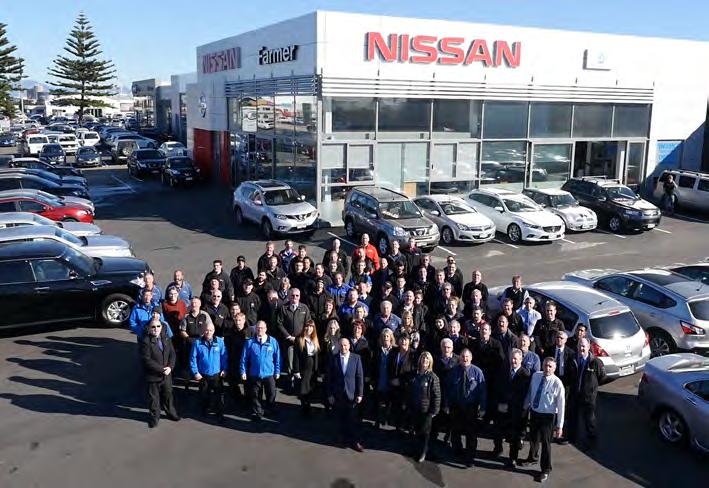

From small beginnings 30 years ago across the harbour on the corner of Elizabeth Street and Cameron Road, Farmer Autovillage has become a distinctive landmark, and the first stop for many motorists seeking a quality vehicle, backed by award winning service.
Back in 1991 when Peter Farmer first put up their Bay Nissan sign with a team of 12 in a city less than half the size of today’s, vehicle choices were a far cry from today’s options.
SUVs were unheard of and there were still plenty of British based models on the road. European cars were exotic machines more common in the movies than on the roads.
But it was from those small beginnings today’s Farmer Autovillage sprung, to cover today’s full city block, employing a team of 170, retailing 13 quality vehicle brands with 600 vehicles under the one roof.
It only took two short years before Bay Nissan started a trend that continues to this day, collecting national dealership recognition by winning the Nissan Dealer of the Year award. It was an award the business went on to collect seven more times on a most popular brand range. Since taking over as group managing director in 2004 and over the next 10 years purchasing the majority shareholding, Mike Farmer can point proudly to multiple awards for service, performance and excellence across the entire brand range that have made Farmer Autovillage one of the most respected dealer-
ships in the Southern Hemisphere.
The company has been an innovator from the start, including pioneering open weekends and a family friendly approach when looking at new cars to make car buying, or even just looking, something of a weekend activity.
The state-of-the-art Hewlett’s Road premises have also ensured a visit, whether for a service or a new vehicle, continues the group’s belief any visit should be an experience to enjoy.
“From those small beginnings 30 years ago, we have worked hard to retain values instilled in the business – ensuring we have a team of
committed people who genuinely want to make their customers’ vehicle experience the most enjoyable possible, delivering an exceptionally high level of standard with integrity.
“That approach has served us well as we have grown through the years. We are particularly proud to have achieved this right here in Tauranga.
“I am convinced the next 30 years will bring even more change, more quickly than we have had as vehicle technology evolves and customers’ expectations with that – we are well positioned to meet those changes and deliver what our customers expect.”
When it comes to displaying all the awards won by Farmer Autovillage and its team, there would not be enough wall space to hang them all.
The company’s success in claiming national awards stems back over two decades, when the team claimed the Nissan Dealer of the Year award eight times after they opened the dealership on Cameron Road.
The Dealer of the Year Awards are held each year to recognise outstanding achievements in sales, parts, finance, service, marketing and customer satisfaction across dealerships nationwide.
Farmer Autovillage’s growth along with the fantastic feedback received from so many customers over the years are just a few testaments of this team’s dedication to excellence and customer care. The raft of awards Farmer Autovillage has received reinforces it further.
For the 2020 award season, the coveted Dealer of the Year award was claimed by Farmer Autovillage for Audi, Jeep, Volkswagen Commercial, Volkswagen Passenger, and Volkswagen overall, all accompanied by a Nissan Dealer Excellence award and twenty individual awards.
Being named New Zealand Dealer of the Year highlights the team’s goals to achieve the absolute highest level of service and professionalism within all aspects of the business.
“For Audi, we have won Dealer of the Year for the second year running. This is a well-deserved reward for our extremely hard-working and close-knit team,” say Blair Woolford, Dealer Principal.
“I am especially proud of how the team keep proving that treating customers with respect and integrity is critical to ensuring ongoing relationships with the business.”





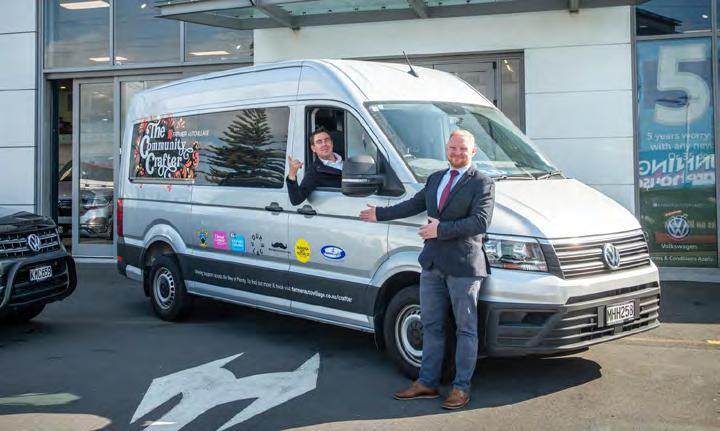


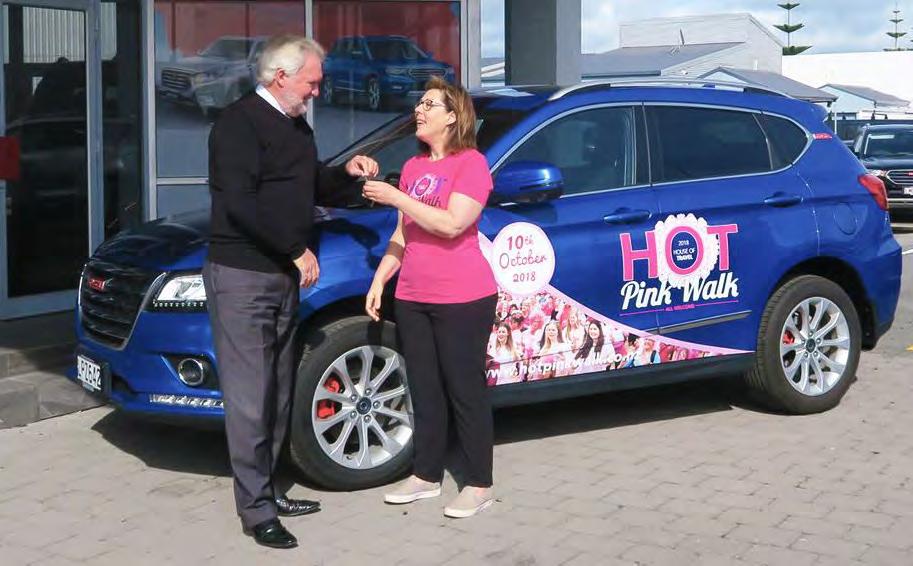
Numerous charities and groups including Tauranga Foodbank, Waipuna Hospice, Breast Cancer Bay of Plenty, Homes of Hope, Tauranga Ladies Luncheon, A Night Before Christmas, Tauranga Garden & Arts Festival, Water Skills for Life Plus, The Kollective, Sweet Louise, Tauranga Boys Collage Rugby, Tauranga Riding for the Disabled, A Night Before Christmas, Bay of Plenty Rugby Union, local surf clubs, bowling clubs and the Pāpāmoa flag pole project have all enjoyed the support and encouragement of Farmer Autovillage over the years.
Farmer Autovillage has helped local causes become more mobile, and able to reach out to the people they are supporting. For many charities the need for a vehicle may only be for a short time.
Farmer Autovillage has long and strong ties to Tauranga, and are acutely aware of the hard work done, usually by volunteers, to keep these charities going. Supporting the community has been a key way the team and business are able to give back.
“We are approached for sponsorship on a regular basis. It’s humbling to meet and work with fantastic volunteers and groups who are working hard to help drive the community.
“The loan vehicles or events that we

support are always anchored in bringing benefit to as many as possible.”
“This year we committed our Volkswagen Crafter van for community use. It was able to be booked for short local loans free of charge. With 12 seats and large cargo space, it was the perfect solution for the local clubs who loaned the van. It provided a very safe and modern way of transport,” says Samantha Hedifen, Group Marketing Manager.
Farmer Autovillage recently renewed its commitment to Movember, the men’s health awareness month by providing a
Nissan Navara, complete with Movember labelling to proudly raise the profile of an important health issue throughout New Zealand.
Movember Foundation New Zealand Manager Robert Dunne says “Since 2019 Movember is extremely excited to partner with Farmer Autovillage. We are known by the quality of the people and organisations we work with and Farmer Autovillage is a renowned and trusted name in the Bay of Plenty.”
Four years’ ago after a break-in at the Waipuna Trust depot resulting in the Trust’s
van being stolen, Farmer Autovillage stepped in to supply the trust with a vital set of wheels.
“Helping out with a van was the least we could do, the Trust’s work is invaluable for people here in the Bay of Plenty,” says Mike Farmer.
Farmer Autovillage’s latest brand additions, Haval and MG have also most recently been seen around town, with MG HS powering the team from Tauranga Chamber of Commerce and a Haval H2 completing the Hot Pink Walk for cancer fundraising and Garden & Arts Festival.
Rapidly developing car technology, electric vehicles, changing purchasing habits and expanding brand choices make for an exciting future for the team and customers at Farmer Autovillage. The team are eagerly anticipating the re-development of the Autovillage’s central showroom hub, scheduled to be completed by early 2022.
This includes a stunning new café area, business lounge and offices, alongside an extended Škoda showroom area, a key brand now utilised by the New Zealand police force.
“Our café, business lounge and complimentary courtesy options are some of the fantastic benefits when visiting Farmer Autovillage. The designs and construction will create a beautiful modern area to relax or use as a base to work from, while enjoying a coffee from our café. We can’t wait to welcome everyone to the new hub,” says Melissa Smith, Group Operations Manager.
Today’s customers are far more informed and knowledgeable when they step onto the showroom floor, having done much homework on-line before even forming an opinion on what car to buy, and often visiting with a shortlist.
“We have responded to this by also ensuring our sales team are very good at working alongside the customers, more of an advisor than sales-person, highlighting the key differences and similarities between the vehicles they may be considering and what will best suit their requirements,” says Warren Carter, Group General Manager.
The company has also strived in recent years to offer services beyond a simple vehicle purchase, incorporating a “one stop shop” approach for all clients’ automotive needs with total vehicle care services.
These includes servicing, parts, acces-
sories, roof racks, windscreen repairs and replacements, a wheel and tyre centre and a brand-new paint and alloy wheel repair centre.
All ensure customers’ vehicles can be tended to quickly and professionally with minimal delay before getting back on the road – an onsite carwash ensures every customer’s vehicle looks their best heading home.
“This year we opened a wheel repair centre as a new and additional service to our total vehicle care solution. Our wheel expert Tyler is able to repair kerb damaged wheels with complete precision using the latest diamond cut technology from Europe. This service is already proving to be popular and convenient for our customers,” says Bevan Sheppard, Group Service Manager.
Always aware of evolving needs in the motoring sector, the company has also identified the need for a trades part centre servicing trade centres around New Zealand.
“Our trade parts centre has grown quickly from its original team of three in 2013, to seven specialists and nine warehouse team members providing genuine parts for 17 brands, all from a new purpose equipped warehousing-distribution centre. We offer nationwide delivery and a dedicated phone line, which are some of the many benefits for our trade customers” says Mark Ferguson, Group Parts Manager.
Further up the coast at Whitianga, locals are now able to enjoy the service and choices offered in Tauranga, thanks to Farmer Autovillage recently establishing a base in the Coromandel township.
A long relationship with the previous owners of SubLab prompted the move. It has provided the base to offer not only an authorised service centre for many brands but also offers a selection of the vehicles that have been offered in Tauranga.
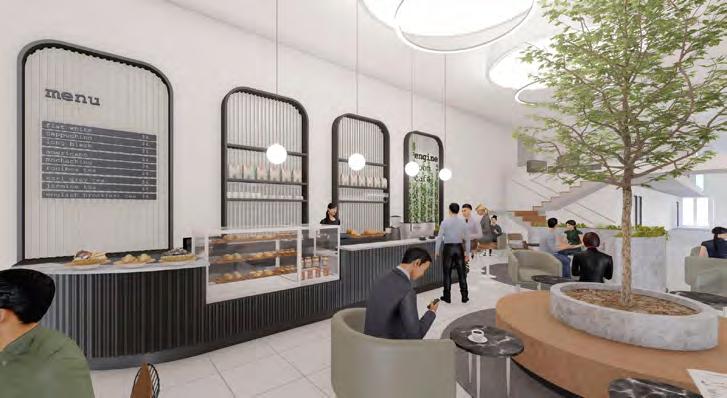




Just as the Autovillage premises have evolved, so too are the vehicles offered to Autovillage customers.
Mike Farmer says electric vehicles are among the most asked about new technologies, one he believes will expand quickly in the coming few years.
“We are getting more enquiry than ever about EVs, but I suspect it will be about five years before they really take off. Meantime we are very well positioned with a range of quality vehicles to meet that need, some that will also qualify for the EV grant recently offered.”
These include the entry point MG ZS EV, Nissan with its new generation LEAF, through to Audi’s eye catching premium EVs including the Audi e-tron, in both GT quattro and RS GT variants.
Recognising the rise in EVs, Farmer Autovillage was the first to provide the only 175kW DC charging station in the Bay of Plenty. Open 24/7, the station
slices many minutes off the conventional 50kW charging units found in the city, and is easily activated through the ChargeNet EV app.
The past 13 years since opening the Hewlett’s Road centre have been exciting and evolving for Farmer Autovillage.
Mike Farmer says he and his team are already gearing up for the future where those changes are only likely to come even quicker, in an industry facing massive changes.
“It is likely to be an exceptional period of change, but we have proven to ourselves, our customers and the industry we are well positioned to manage those changes.
“As we do, one thing won’t change and that is our absolute commitment to our customers and our community, providing the best in service and brands, nothing is ever a problem at Farmer Autovillage,” says Mike.




> BY NATHAN BONNEY
Nathan Bonney is a director of Iridium Partners. He can be reached at nathan@iridium.net.nz or 0275-393-022
ith over 600 systems covering just about every conceivable business service and function, choosing a franchise business can be a daunting task for most people.
A common approach has been for potential franchisee entrepreneurs to create their short-list based on an industry or category that interests them, or which they believe will provide them the financial returns and lifestyle they desire.
There is nothing wrong with this approach and it is a good start, as enjoying what you do so very important. One of the main drivers as to why people do what they do is how does it make them feel?
Owning your own franchise business is after all not just another job, it’s an extension of you and the lifestyle you have chosen to enjoy.
The past 18 months or so has seen a greater focus on this and it will continue on as we move forward in a world with Covid.
If you are reading this, then you probably have an interest in exploring franchising and perhaps have started thinking about what might suit you and your lifestyle. As you start down this path there are a couple of preliminary questions to consider:
• What do you enjoy doing about what you are currently doing and on the flipside what do you not enjoy in what you are currently doing? Many people fail to delve down into this and find it difficult to pinpoint but it is an important area to cover off.
• What current skillset do you have? You might have a qualification in a specific area – is this relevant to what makes you happy? Do you enjoy the work associated with your qualifica-

To have a successful franchised hair salon does not necessarily require you to be a trained hair stylist, you would, however, require good business management skills
tion? So, perhaps the fact that you have a qualification demonstrates that you are coachable, trainable, and tenacious to see things through. Are you brave enough to try something new utilising the core skills you already have? What transferable skills do you have ie are you a person who thrives on customer interaction, managing people, or are you a dab hand at working with tools?
• Do you enjoy the outdoors or prefer to work in an office type environment?
• Are you someone who needs variety in their work, or do you prefer to have a set routine?
Enjoying what you do is so very important, having the precise skillset for a specific fran-


chise business is less important as long as you have transferable skills.
For example, to have a successful franchised hair salon does not necessarily require you to be a trained hair stylist, you would, however, require good business management skills as at the end of the day you are responsible for the growth and success of the business overall not just cutting hair.
Being coachable and able to follow a system is fundamental, enjoying what you actually do day to day is critical.
Everyone has a unique skillset, it just comes down to being able to identify this and perhaps try something new. Taking the leap does take bravery but is so very, very rewarding.
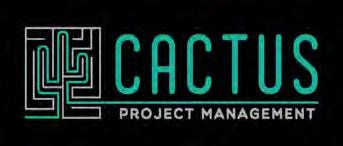


As Bay businesses move into post-lockdown 2.0, the months ahead will be challenging. With resource constraints in staff and stock plus production and project flow bottlenecks, businesses are focused on resuming their optimal operational levels.
Leadership, guidance and support are what businesses need to help them successfully navigate and manage the challenging environment ahead.
This issue, our special feature draws on industry experts and businesses to hear their story, plans and forward vision for doing business in this economic season.
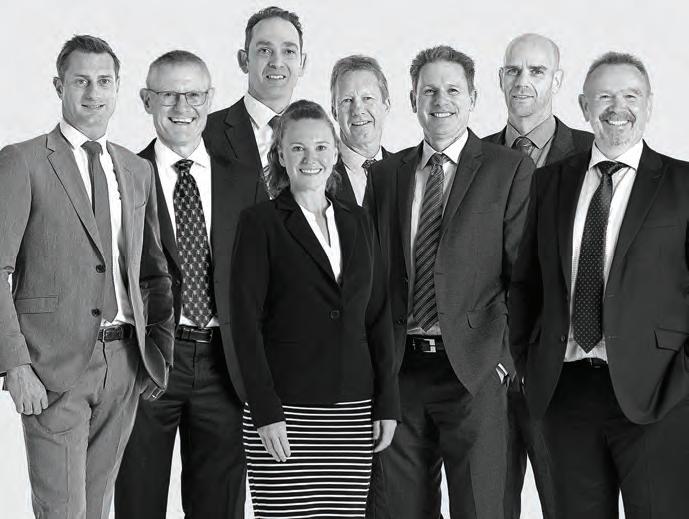
Over the last 18 months Covid-19 has changed the way we work, the way we interact and the way we do business. Remaining connected will help NZ business navigate through.
2degrees is in the business of connection, as a full-service telco offering mobile, broadband and other technology experiences. This focus on connection manifests itself in a few different ways at 2degrees, says Chief Business Officer Andrew Fairgray, and that’s through providing customers with a strong and reliable network, by building meaningful external partnerships, and by continuing to provide products and services that businesses want and need.
“We’re all about Fighting for Fair for Kiwi Business, and we see these three things as critical to supporting that purpose, as well as NZ Inc,” he says.
The 2degrees network: Business connection, in or out of lockdown, starts with a strong network says Andrew, and in the Bay of Plenty region 2degrees has had con-
sistent network coverage for some time, with 96% of the region where kiwis live and work covered by 2degrees’ 4G network.
The $1 billion spent on the network in recent years hasn’t gone unnoticed by customers either, with 2degrees taking out the Canstar Blue Small Business Telecommunications Most Satisfied Customers award for 2021. The award recognises a range of different drivers which contribute to customer satisfaction, including network, and 2degrees scored 5 out of 5 stars in this category, the most of any telco included in the survey results.
Meaningful partnerships:
2degrees has also made strong connections with external partners, particularly those with shared values of backing Kiwi businesses to thrive.
One of these is Manaaki, a company started as a SME advice tool in the first nationwide lockdown last year. It has grown into a community that’s engaged with more than 300,000 New Zealanders to empower them
NZHL Tauranga business owner, David Hill, shares why now is the perfect time to review your home loan.
With interest rates on the rise and ongoing Covid uncertainties, the cost of ‘the mortgage’ now and in the future is something many homeowners are rightly reflecting on.
While low-interest rates help reduce your interest costs (for now), they won’t optimise the money you have available to you daily to shorten the life of your home loan.
At NZHL, we believe the key to financial freedom is about focusing on what you can control, like your home loan structure and spending and timely reviews, to ensure your structure is still working for you if your plans change. In essence we work with our clients to make the most of
their mortgage, not the other way around!
The key is coming up with a plan that is tailored to work for your personal circumstances – it’s all about setting up your surplus and defining your goals.
Ultimately if your goal is to pay off your loan as quickly as possible, you may consider increasing your payment amounts – even $50 a week will help you get there quicker. However, if your goal is to add in an investment property or renovate your home, your advisor will need to consider the impact on your payment plan.

with advice from business experts, content to upskill and grow, and networking opportunities.
“Prior to lockdown, we partnered with Manaaki to develop Kōrero with Manaaki, which gives business owners the opportunity to catch up with a Kiwi business expert to have a chat and learn from their insight and expertise,” says Andrew. “Once the country moved back to level four, we worked with Manaaki to get Kōrero out to more businesses, giving them expert advice when they most need it, on us.”
Providing business with products and services to keep them connected:
A recent iteration of the 2degrees Shaping Business Study highlighted that it was strong and reliable broadband, correct technology set-up and cloud security for protection that would keep business operating and connected through lockdowns and beyond. So, 2degrees business has been launching timely and relevant new products to market including
an out-of-the-box software-defined wide area network (SD-WAN) solution called Insight Network that simplifies the management and operation of a business’ WAN. Insight Network provides organisations with network control and visibility, insights, data safety, and application prioritisation.
“We know more than ever before that businesses are exploring their options when it comes to the cloud and the opportunity SD-WAN brings. This solution is fully scalable and delivers what we know our customers are looking for, business efficiency, convenience and simplicity” Andrew says.
“Everything we do and deliver at 2degrees is so businesses can focus on what matters most, staying connected and doing business, whether in lockdown or not.”
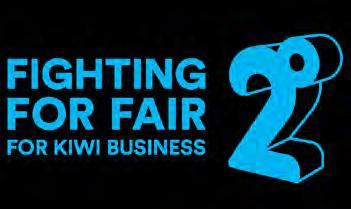
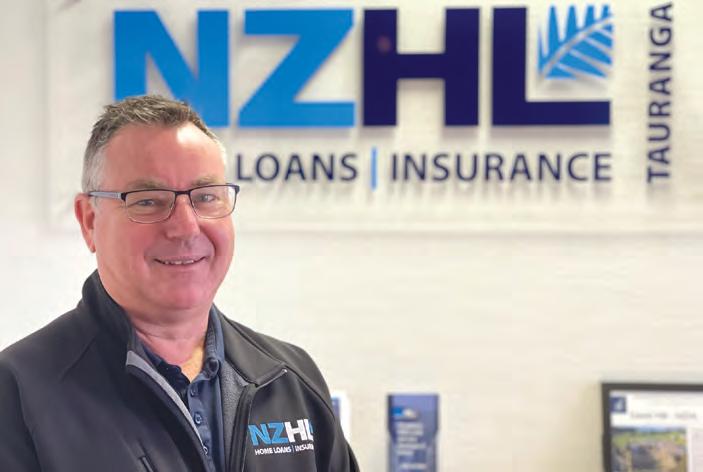
Remember, your mortgage structure should be tailored to meet your personal needs and goals – at NZHL, we call this our smart home loan structure. While we tailor it to suit the individual, essentially, it’s all about using your income and savings to offset the interest you pay, which can reduce the life of your loan in the long term.
Now’s a very good time to consider your financial future and how NZHL can help you make the most of your
mortgage. We’re 100% NZ owned, 100% passionately kiwi and are all about helping Kiwi’s achieve financial freedom, faster with personalised service.
If you are looking at switching providers, there are things to consider, like the lifecycle of your loan, break fees, and other clawbacks for benefits provided, but that’s where NZHL’s personalised service comes in – we will work this through with you. Are you making the most of your mortgage? Come in for a chat see what’s possible for you!
The culture and perception of a business are often defined by the way it communicates with its staff, customers, and the public.
When communication is done well, businesses flourish; people are empowered and engaged, productivity increases, and retention rates improve. There is also a clear link between a brand’s reputation and a company’s bottom line.
If there has been one good thing to come out of the Covid-19 pandemic from a business perspective, it has been the importance of having great communication.
Following Aotearoa New Zealand’s first lockdown, many businesses put a concerted focus on communicating how they were navigating the



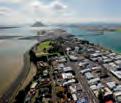
pandemic and how it affected their people and customers. That effort has largely continued over the past 18 months.
Organisations that have done this well have helped to combat the heightened levels of anxiety and uncertainty that people are experiencing around the Covid-19 pandemic – on a personal and a professional level.
Covid has significantly changed the operating environment and businesses have been forced to adapt quickly, think outside the square, and embrace digital technologies and new ways of connecting and communicating.
Where once both internal and external communication were
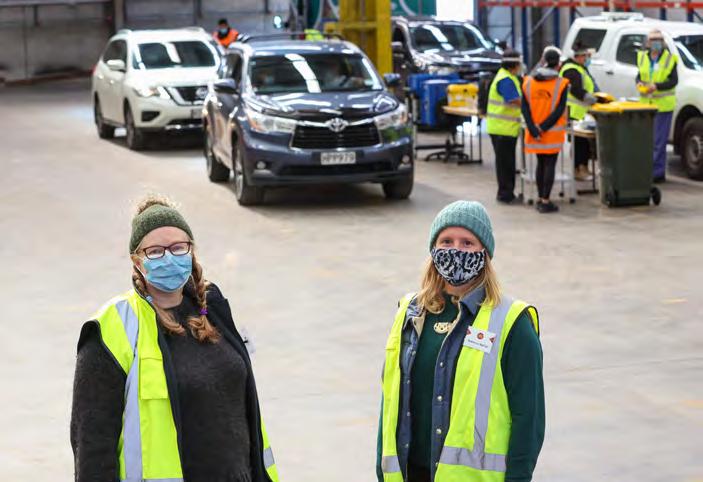
afterthoughts for many businesses, it has become clear that refining the nuances and delivery in your messaging needs to be a top priority.
This is where bringing in a specialist strategic communications consultancy to lead these discussions will give your business the advantage. The Shine Collective tells the stories that matter to shape the communities we live in, and it is never been a more important time to get this right.
Our focus continues to be on supporting our clients to navigate how they get their story told in
a noisy, Covid-dominated media environment , as well as help them to realise the communications opportunities for their business now and in the future.
Our role is to work closely with you to develop and implement a strategic communications approach that supports your business objectives and strategies, while building your reputation.
Engaging the expertise of a communication consultancy will ensure you’re forging genuine and long-lasting connections with the people that matter the most to you.

It’s 2021, Covid19 has ravaged the world, the ways we think of working have changed radically, and we are now working from home where we can. Business data is now spread out over more and more locations and on even more devices.
Files and paper are becoming less important (as they should with the drive to be more eco-friendly), and more and more critical business information is only in one place … on your laptop!
We have our essential business presentations in PowerPoint, our budgets and forecasts in Excel, our important template letters, and our strategies in Word. Then we have our designs, supplier contacts and excel sheets, customer lists, and records of meetings … our whole business depends on all that data.
What if one email to everyone in your company, seemingly a Payslip,

triggered a Ransomware infection and encrypted all that data? Sure, you can reinstall all the laptops to get them going again, but where will all those vital documents be? What if your laptop got damaged and was unrecoverable?
There are some critical questions CEOs and boards should be asking, and one should not assume all these are being adequately done; it’s possibly even more crucial than an audit!
Here are some important questions to ask:
• What is the actual cost to your business if all your data is gone forever?
• Do you have a daily backup?
• Do you know what it is backing up?
• Is the data from your cloud-based storage and email also backed up?
• Is the backup immutable (can’t be

deleted by even your IT guy)?
• When was it last tested to ensure it can restore?
• Who is responsible for your backups?
Be aware that OneDrive, Google Drive and iCloud are not proper backups. They are great for sharing files and having a copy available online and easily shareable. Still, they do not
follow the correct backup process. There have also been cases where a previous staff member has created personal OneDrive accounts, a credit card expires, or password is lost, no one can find that ex-employee, and you are in trouble.
Our advice is to get an IT professional to ensure your backups are in order.

Insurance is something most business owners know is necessary, but don’t have time to turn their full attention to. Crombie Lockwood designed its SMARTpak cover specifically with the needs of New Zealand SMEs in mind.
SMARTpak, is based on the four pillars of insurance that are important to the majority of SMEs. These are: material damage, business interruption, liability and commercial motor vehicle cover.
Crombie Lockwood’s years of experience working with SMEs really shaped the structure of SMARTpak and it has some important benefits built in to ensure appropriate coverage that clients may have not otherwise considered.
As an example, within the material damage policy benefits and with basic conditions met, a business can claim up to $1 million if that business is unintentionally underinsured.
The premiums however are based
on the declared sums insured, not the $1 million limit. This offers a lot of peace of mind and SMARTpak is the only package to offer this type of cover.
A powerful safety net in a difficult business climate
Crombie Lockwood are passionate about SMEs and their success especially as they are the backbone of New Zealand’s business community. Putting clients’ interests first is among our values and SMARTpak is very closely aligned to that value.
SMARTpak has proven itself to be a powerful safety net for clients, with the $1 million cover component being utilised for many businesses that

might not otherwise have been fully covered. Given the uncertainty some businesses have faced in the last 18 months, there is a great sense of pride within Crombie Lockwood that we can exclusively offer the benefits of SMARTpak to the businesses that need it most.
Alleviating worry for SME’s has been amplified in the challenging business environment. Crombie
07 579 7600
crombielockwood.co.nz
One of the key drivers for the Tauriko Business Estate’s appeal to investors is the strength of the Port of Tauranga and the easy motorway access from Tauriko to the Port, notes Commercial Managing Director, Philip Hunt.
“When we last spoke about Tauriko (around last year’s lockdown), there was some uncertainty,” says Hunt, who is a well-established expert on the Estate’s activity.
“But how wrong we were! Demand has been incredibly strong in all aspects of the market, including retail, commercial and industrial –Tauriko came out swinging.”
Hunt comments that Tauranga tends to underestimate the strength and significance of the Port, citing
Lockwood has introduced a special SMARTpak introductory offer until the end of November 2021, which means eligible SMEs who are not currently insured with SMARTpak can save 20% on SMARTpak insurance.
Get your insurance sorted with your local Bay of Plenty team Phone 07 579 7600
crombielockwood.co.nz


the example of Auckland company Winstone Wallboards, which is well advanced in building out a 13ha plasterboard manufacturing and distribution facility within Tauriko Business Estate.
“One of the reasons they are here is because of the ease of transport to our Port,” he says.
“It’s the motorway access to the major roads and it’s the Takitimu Drive access to the Port,” he says. “This is what I’m hearing almost every day
when I speak to tenants and buyers. And of course, with Tauriko growing, you’ve got the economy of scale –everybody wants to be there.”
Hunt says the fact that the Estate is getting built-out doesn’t matter as potential purchasers are demanding the opportunity to buy from existing owners.
He notes that when the region moved into lockdown recently, he and his team felt that working from home was just like a normal day at the
Phone: 07 928 0000
Email: tauranga.commercial.nz@raywhite.com
office with activity levels. “Nothing seemed to change and the level of enquiry was as strong as ever.”
Hunt, who recently won Top Commercial Agent at this month’s Ray White New Zealand awards for the sixth year in a row, pays tribute to his experienced team, crediting his PA Kate Bosworth with helping secure his latest award.
“We have a boutique, professional and loyal team, each member offering unique strengths.”

The latest Covid-19 lockdown has highlighted a new reality. The old ‘business as usual’ mindset can no longer be relied on to take your business into the future.
The new reality of operating alongside Covid-19 requires proactive future planning around current and potential revenue streams. We encourage rethinking your business strategy and being flexible with goal setting which will help your business overcome further challenges. Now more than ever, it’s important to maintain good relationships with your creditors, client base and your team.
The new reality of business has paved new ways of thinking and
change. Clients that have been successful in achieving higher profitability are the ones who have proactively reached out to us. We work with them to achieve a future focus through compiling annual forecasts and adaptable plans. Through this process we’ve found that business owners who are open to learning and developing extra skills have reaped the benefits of improving organisational culture which in turn improves the bottom line.
While managing the ever changing environment it is important to focus on making decisions that will benefit the business in the long-term. We recommend our clients take the following actions to grow their business

and reduce risk during these uncertain times:
• Build better habits – Have a plan to implement changes in your business to help it grow. The smallest change can compound into great rewards.
• Create an annual forecast – with the help of your advisor, focus on maximising revenue and cutting out unnecessary expenditure.
• Get stuck in – Stay actively engaged with your creditors and your client base, ensure that your good relationships are maintained.
• Stay calm – Don’t opt for a short term focus that could be detrimental in the long term.
• Be open to learning.
• Take care of your team and the community.
We are holding free webinars over the next couple of months to discuss future proofing your business. Contact tauranga@bdo.co.nz to be added to our mailing list for the latest updates on how to prepare your business, or if you have any queries please reach out to Linda Finlay.


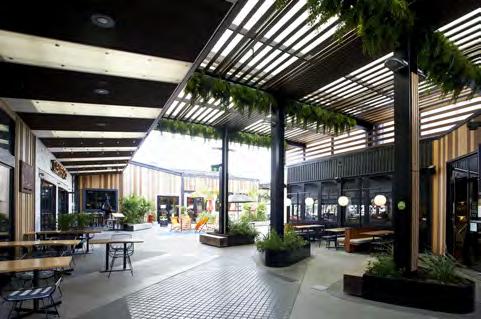

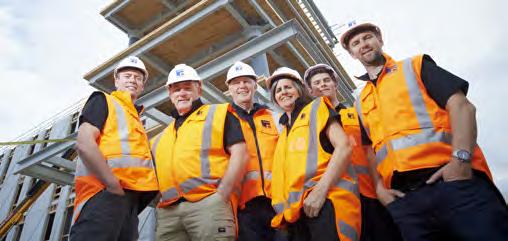
Since 1992, our diversified commercial property funds have delivered regular and reliable cash returns to investors through multiple economic cycles. PMG’s strategy has always been to offer defensive investments diversified by geography, tenant and business sector. In times like these, our approach has proven to be the right one.
With over $750 million worth of assets under management across our five unlisted commercial property funds, PMG is known for being one of the country’s most trusted and established property funds managers.
Our most recent offer saw PMG Generation Fund (the Fund) acquire the high-profile Bethlehem Town Centre here in Tauranga, and we welcomed more than 2000 new investors on board. The centre is underpinned by notable national and multi-national tenants, some of which are classed as essential services or were able to operate at Level 3.
This brought the total portfolio value to $166.1 million*, which com-
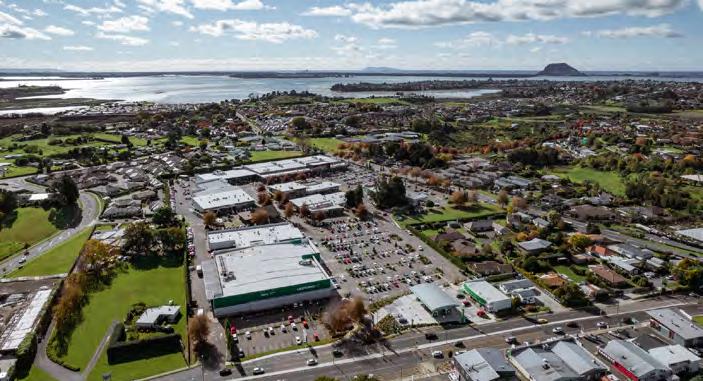
prises five commercial properties located within main metro centres across New Zealand.
“When we launched PMG Generation Fund in 2020, the aim was to help more New Zealanders gain access to the benefits of investing in commercial property, providing regular income and the opportunity for good capital growth on their

As market leaders in top end Tauranga real estate, Jason & Cameron of Oliver Road have experienced firsthand the aftermath of last year’s lockdown – the booming property market we’re still in.
Few would have predicted during those first days, and the extraordinary news spreading across the world that over the next year, here in the Bay of Plenty, median house prices would increase by 25% and that interest in unique, high-value homes would be the strongest it has ever been.
This all makes sense. Demand soared as expats returned home and those outward bound paused or canceled their plans.
Supply tightened as owners found more enjoyment in their current homes or were unable to find suitable replacements, and the availabil-

ity of credit became overwhelmingly attractive to those with the appetite and patience for signing countless unread pages of commitment.
Although not expecting a repeat of last year, as the second Level 4 lockdown was announced, Oliver Road’s approach was to lean in and look through.
Having recently taken on several full-time trade staff in the development of their pre-market improvements service, the priority was to reassure those staff of their job security and to pay 100% of usual wages throughout. This approach was
investment,” PMG Chairman Denis McMahon said. “This latest offer has certainly achieved this.”
Not only does the Fund offer a low minimum entry point, but PMG’s Reinvestment Plan also allows investors to reinvest their distributions from any of PMG’s funds into units in PMG Generation Fund (subject to availability) – allowing investors to
reap the rewards of compounding returns. PMG’s online Compounding Calculator helps investors see just how their money could be working harder for them.
While PMG and our funds are not immune to economic headwinds, our investors’ investments and our properties are in experienced hands. We have complete confidence that all our funds are well placed to thrive in these uncertain times.
If you are looking for regular and reliable income from a historically robust and resilient asset class, get in touch with your local PMG Investor Relationships Manager today by visiting www.pmgfunds.co.nz.
Disclaimers

rewarded with a team of grateful and motivated staff ready to do whatever was required as restrictions lifted.
Feeling confident in their team’s readiness to deliver the international award-winning service allowed Jason and Cameron to focus not on Level 4 but rather to look straight through to the coming months.
Safe in the knowledge that in any

market, the best choice for a vendor will remain the best, this time around Oliver Road has doubled down and leant in – not scaling back but ramping up investment in new people, technology and marketing.
With a near-full spring calendar of $2M+ listings being prepared for the market; one thing is certain – what Oliver Road is doing is working.


The changes wrought by Covid-19 on businesses have created effective and long-lasting new ways of working as companies look to capitalise on the operational savings made during lockdown. Jade Maddox, managing director of shared work, meeting and event space BloomCo, discusses what this means for local businesses.
“Last year, when Covid-19 first landed in New Zealand, we had just opened a shared working premises in Pyes Pa. Many people said to me that things were going to be challenging; that nobody will want to work near others after this,” says Jade.
“My response was “I think it’ll be alright, mate”, and what an understatement that turned out to be,” she says.
Jade believes that the old saying, necessity is the mother of invention, has proven true as businesses seek new ways of working.
“Consequently, the popularity of
flexible office spaces has never been higher. Covid actually provided the impetus to super-charge the revolution in changing the way we work and do business in this country,” she says.
“By now, every business here has experienced working from home and seen the many pros and cons of that compared to our traditional standards and expectations around ‘office time’.”
Businesses of all sizes are moving in droves away from the office-based, fixed commercial lease model. Bayleys Research recently reported that
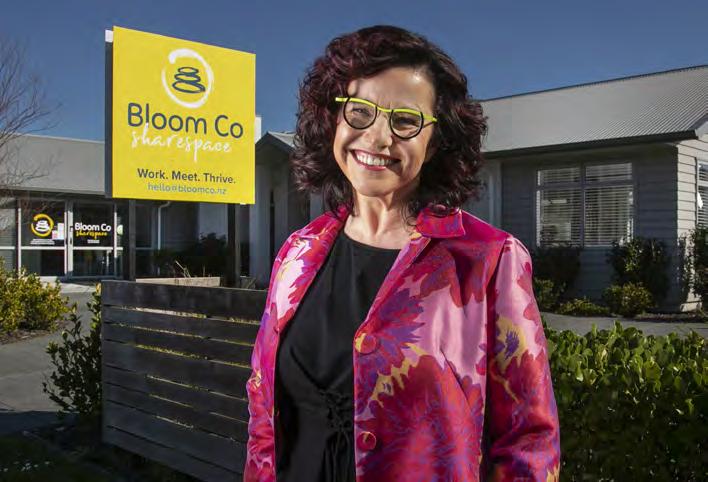
more than half of all Vodafone NZ staff work from home, and BNZ have cut 30% of their office space for a permanent shift to hybrid flexi working and adaptable “liquid spaces”.
With the greater prevalence of coworking spaces, especially in the suburbs, more sole operators who traditionally based themselves from home are also now using such premises as a flexible base or a professional front for meeting their clients.
Globally, research suggests 5 million people will be working in cowork-

ing
by
from today.
Here in New Zealand, Jade says that the industry is still evolving to meet client needs.
“While some still seek hotdesking spaces, there is more demand now for businesses seeking private office spaces with shared areas, and room for meetings and collaboration.”
“Locally, Tauranga is lucky to already have a plethora of coworking premises, each with their own vibe and options to meet the needs of those in our community,” she says.
Shared work, meeting and event space hello@bloomco.nz | 021 061 6961 bloomco.nz
Kale Print’s manager Peter Lloyd is philosophical when it comes to talking about the lockdowns which have plagued businesses throughout the last year; “Having been through this before allows us to quickly mobilise our team under lockdown levels in order to keep operations going. We have been fully operational for all essential communications under lockdown level-4 which has sustained our business and also provided some new oportunities.”
According to Lloyd, their clients are ‘in good hands’ – Kale Print’s highly skilled team are able to operate remotely for estimating, account management and studio work during lockdown.
That means they’re always ready to hit the print button as alert levels come down, allowing for non-essential communications. “Even through lockdown the direct lines of enquiry

have been open and flowing.”
The business has worked hard to adapt to the new normal. Not only for meeting the current environment but to keep their people safe. “As things change we will continue to communicate to our staff and clients to ensure safety protocols are followed”.
Looking beyond the world of lockdowns, he says Kale Print remains focused. “The key is keeping an eye on the temperature of the economy, being sensible and keeping our greatest asset, our team, on board.”
“Also making sure we continue to evolve and implement strategies to keep us up with market demands and trends as we have done for generations.”
This means not lessening the focus on technology, or on reducing the company’s environmental footprint. “We offer a broad range of visual communications, not just traditional print. From design to signage to packaging – for small boutique businesses to large corporates, as well as trade partners such as other
printers – we support a wide demographic nationally.”
“Being out of the Covid hot spots like Auckland has allowed us to be more agile and to provide support from the regions,” he says.
According to Lloyd, “Technology has been key. We are doing a lot more Zoom and Teams meetings these days. This helps to reduce the location barrier even more for our clients nationwide. And, of course, we also have a strong presence online via social media, google and our website,” he points out.
“It’s been pleasing to see our enquiries exceeding pre-Covid levels demonstrating the resilience of the business community in the Bay of Plenty”. It’s a great feeling to be able to support businesses in continuing operating as uninhibited as possible. Offering a level of certainty during these unpredictable times.”


Trustpower Baypark is open and gearing up for an exciting line-up of events to finish off 2021. As the “Hub of Entertainment” for Tauranga and Bay of Plenty we have a variety of events for the entire family.
Opening night for Baypark Speedway is set for Saturday October 23 and will see all adrenaline junkies come out of hibernation. The opening night is just the start of what is set to be an action-packed season. There will be no shortage of thrills this Speedway season. Once confirmed all speedway dates can be found at www.bayparkspeedway.co.nz
Did you want to treat one of your valued clients? Or how about coming to Speedway for your Staff Christmas party?
We have a number of exclusive, spacious corporate boxes with balconies to entertain up to 20 guests comfortably. These boxes are also available on an annual basis to cover the entire Speedway Season.
Please contact us on events@bayvenues.co.nz or 07 577 8593 for more information.
Create your happy place at the Bay of Plenty Home Show. Explore everything from blinds, builders and beds to spas, solar and smart home technology – over 200 inspirational exhibitors showcase the latest products and services to bring your next home improvement project, renovation or new home to life.
See food come to life in the BespOak Live Cooking Theatre featuring the iconic Jo Seagar each day at 11.30 and 2.30, doing what she does best – minimum effort for maximum effect! Chatty and relatable, Jo brings you great recipes and tips so you can dine in style without breaking the bank.
Enjoy the range of food trucks,
entertainment for children, go in the draw to win great prizes and take advantage of exclusive show deals and offers. Find everything you need from top of the line to budget conscious – and have fun doing it! – at the Bay of Plenty Home Show 29, 30 & 31 October.
The 2021 New Zealand Weightlifting Championships is returning to Mount Maunganui this November. This event will be action packed, with over 120 of New Zealand’s top Junior and Senior athletes competing across 10 weight classes. Catch Olympic and Commonwealth Games athletes live, as well as our up-and-coming talent. Impressive feats of strength and coordination will be on display across three busy days; from Friday 19 November to Sunday 21 November.
Battle of the Trades IV
BAY BOXFIT is proud to bring to you Base Up BATTLE-OF-THETRADES IV – The Bays Best Charity Boxing Event.
A very popular Corporate Boxing show which showcases tradespeople challenging themselves by navigating their way through 3x 2 min rounds against one another.
This is a BLACK TIE event so be sure to dress to impress on 13 November.
Polo in the Bay
Polo in the Bay is more than just a new event, it’s a whole new tradition on 27 November. Every year, we’ll be kicking off the Mount Maunganui Summer with



fast-paced entertainment and firstclass hospitality – it’s a weekend that’s hard to resist.
The inaugural event features some of New Zealand’s most talented Polo players going to head-to-head in their provincial colours and this fresh Polo format brings you closer to the action
– there isn’t a bad seat in the house.
We have a range of hospitality options available, from a casual picnic-style Family Zone, to Private Marquees and the VIP Pavilion with specialty bars, catering and lounge areas.
Polo in the Bay features include:
• Movember Brunch (R18)
• The Polo Lawn (R18)
• VIP Pavilion (R18)
• Private Marquees (R18 – limited spaces)
• Free Family Zone (unlicensed – all ages)
• Après Polo – Eat + Drink + Play at our Official Dining Precinct Tickets available from www. polointhebay.co.nz.
Do you need a girls’ day out? The Women’s Lifestyle Expo is a two-day event for woman of all ages, featuring everything from fashion and beauty to health and fitness, artisan good, gourmet food & beverages and much more.
This is the only event of its kind happening in nine regions across New Zealand so grab your girlfriends, sisters, mum, grandma or daughters for the ultimate weekend at the Women’s Lifestyle Expo on Saturday 18 & Sunday 19 September.
Tickets are just $10 at the door or get a 2-for-1 deal on GrabOne in the lead-up to the show. Kids under 12 are free.
Aotearoa’s Dub & Bass heavy-weights, the space-weaving Salmonella Dub will be here 3 December.

The multiple platinum-selling and award-winning D&B pioneers are performing across Aotearoa, delivering what promises to be a phenomenal two-hour multimedia dance floor set of the Dub’s classics, alongside a bag of new tunes from their forthcoming album Return To Our Kōwhai
Joining the band on stage for this auspicious spring tour are old time members Conan Wilcox and Tiki Taane, plus special guests Whirimako Black and Laughton Kora.
From their very first live appearance in 1993, to these forthcoming Aotearoa Spring Tour shows, passion, creativity, energy, driving bass beats and pure joy are the signature hallmarks of Salmonella Dub live.
The 7 Days Live tour is now officially an annual tradition. And this year our comedians will smash out 13 shows in 13 towns around New Zealand with (nearly) no fear at all.
Jeremy Corbett, Dai Henwood, Paul Ego and the team jump in a van and bring much-needed comedy to the nation, laughing directly in the face of Covid-19 (wearing a mask of course). Don’t miss this show – part quickfire stand-up from the country’s best, on 16 December and part a completely un-censored and un-edited 7 Days show, it’s exactly the medicine we need in 2021 (along with the vac-
cine of course). Be there to see our comedy heroes, live!
It’s never too early to start thinking about Christmas
It’s that time of year again when your work social committee starts to brainstorm ideas for your staff Christmas party. What have we done before? How can we make it better than last year?
Sure you could invite everyone to the conference room for drinks, or go out for dinner – but that’s all been done before.
Why not celebrate the festive season at Baypark this year and indulge in a delicious Christmas feast created by our award-winning Executive Chef? Why not make your party extra special and visit BayStation and enquire about Drift-triking or Blokarts? To book or make an enquiry call 07 577 8560 or email events@ bayvenues.co.nz.
Tauranga’s Premier Venue
Trustpower Baypark is Tauranga’s Premier Venue for conferences, meetings, entertainment and exhibitions. Offering a complete package in one convenient location that features state of the art meeting rooms, in-house catering, audio visual services, professional conference organiser (PCO) and marketing/promotional services.
Tim Hunter’s excellent piece in NBR, 20 August, The flaw at the heart of water reform called attention to the disjunction between councils’ 100 percent ownership of the infrastructure with their 50 percent control of the oversight boards. This understates the impact of the three waters proposal.

By GARY JUDD, QC*
Councils now own drinking water, wastewater and stormwater assets, directly or indirectly. That will change. Only iwi/Māori will have ownership rights. Directly in some respects, indirectly in others. Local authorities will have none.
Legal scholars argue about what is meant by ownership, but it is certain that if one has no rights in relation to a thing — e.g., no right to use it, to enjoy it, to gain a return from it, to dispose of it, to destroy it, to control it or to control its use — one does not own the thing.
The government, whilst claiming that the new entities would be publicly owned, did not say how. Under pressure, by the end of June the Minister, Nanaia Mahuta, was saying they would be owned by local authorities, by being listed as owners in the legislation.
As the proposal deprives local authorities of all the rights of ownership, this “ownership” is a fiction. It is “spin” on a grand scale.
Listing in the legislation does not confer ownership if it does not confer ownership rights.
Three Waters to be dominated by “rights and interests of iwi/ Maori”
Hunter referred to a Cabinet paper, under Mahuta’s name, titled “Protecting and Promoting iwi/Māori rights and Interests in the New Zealand Three Waters Service Delivery Model: Paper Three.”
At least the Minister is sort-of upfront about what she is doing. As you can see, the title is premised on iwi/ Māori already having rights and interests in what councils now own.
Analysis of the Cabinet paper shows a clear intention to establish a system dominated by the “rights and interests of iwi/Māori”. It commences with a preamble from Michael Webster, Secretary of the Cabinet, setting out what has previously been agreed and what will be agreed at the Cabinet meeting.
The first paragraph of Webster’s preamble asks that it be noted that government has ambitions to improve the safety, quality, resilience, accessibility, and performance of the three water services, in a manner that is efficient and affordable for New Zealanders “and which protects and promotes the rights and interests of iwi/Māori in the proposed new three Waters service delivery system.”
Following Webster’s preamble is Minister Mahuta’s
Cabinet paper itself. Paragraph 8, in the executive summary, comes closest to summarising iwi/Māori rights and interests: water.
It says [they], “can be a taonga of particular significance and importance to Māori and the Crown has a duty to protect iwi/Māori rights and interests under the Treaty …, and existing and subsequent Treaty settlements…. The Crown has responsibilities under the principles of Te Tiriti to protect such a relationship and allow for an appropriate exercise of tino rangatiratanga alongside kāwanatanga.”
Note the sleight of hand. Water can be a taonga for Māori. Perhaps it can be, but the question is, is it in this case? Specifically, is drinking water in a Council dam, reservoir or pipes taonga? Wastewater in sewers and sewage ponds? Stormwater channelled from the streets to the sea?
According to māoridictionary.co.nz, taonga is “treasure, anything prized — applied to anything considered to be of value including socially or culturally valuable objects, resources, phenomenon, ideas and techniques.”
Drinking water is vital for life. Without it we die. It is not just of value; it is essential for everyone. Proper disposal of wastewater is hygiene and disease prevention for all. Proper
disposal of stormwater is needed by everyone. Not just Māori.
Water is taonga for all
If taonga is to be the basis for an alleged right or interest, the Cabinet paper should explain why these specific waters have that status, and why iwi/Māori are being singled out as the only ones within the country who have the right or interest.
Paragraph 8 also referred to the Crown’s duty to protect iwi/Māori rights and interests under the Treaty.
Appendix B purports to be an analysis of iwi/Māori rights and interests, but it does not analyse relevant rights and interests. The analysis should have been directed to Council provided drinking water, wastewater and stormwater systems and the associated Council (not Crown) owned assets (“council services”). It’s the old trick of asserting something without proof, and then moving quickly on in the hope that no one notices that an unarticulated foundation has never been proved.
The classic example is: “when did you stop beating your wife,” incorporating the assumption that at some stage you started beating your wife.
The first item in Appendix B notes Article two Treaty right to make decisions over
The Government’s Three Waters Reform proposal aims to ensure that all New Zealand communities have safe and sustainable drinking water supplies, wastewater reticulation, treatment and disposal systems and stormwater services.
By ANNE TOLLEY, Tauranga Commission Chair
Those services are currently provided by local councils and while they are generally in good shape in the western Bay, many communities are not in such a fortunate position.
A national study indicates that to continue to meet environmental and water quality standards, keep up with demand and cope with the impacts of climate change on our three waters infrastructure, New Zealand councils may need to invest up to $180 billion over the next three decades.
Given that many councils, including Tauranga City, are debt-limited, that’s a scary prospect.
To futureproof our waters

services, the Government is proposing the formation of four regional entities that would not be constrained by debt limitations and would have the capability required to provide the high-quality services New Zealand needs.
Tauranga and 21 other councils from Waikato to the Whanganui/Rangitikei area would be part of, and would
own ‘Entity B’, on behalf of their communities.
If the proposal proceeds, Entity B would own all of the waters assets, take-on all of the debt relating to those assets and – from 2024 onwards –be responsible for providing and maintaining three waters services and any investment required to ensure they remain fit-for-purpose into the future.
That’s the big picture, but as always, we have to consider the detail before making any commitment on our community’s behalf.
In that regard, the Commissioners have a number of issues to raise with the Government. These include:
The need to ensure that our communities can provide local input into the reform process
• Protecting our water assets
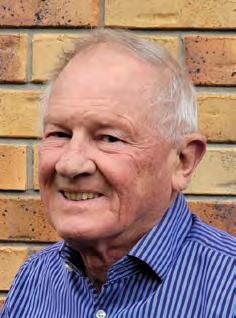
resources and taonga, which Māori wish to retain and assumes, without proof, that this applies to Council services. Council services were created by councils using ratepayer funds.
Māori cannot “retain” something Māori never had. This is a confidence trick. It is not retention of rights; what the Minister proposed, and Cabinet agreed to was acquisition of rights.
The second item relies on Article 3 and states “Implicit assurance that rights will be enjoyed equally by Māori with all New Zealanders. This may warrant special measures to attain that equal enjoyment of benefits.” Another confidence trick. Equality for all is translated into special considerations for some.
Litigation risk to be created
against privatisation
• Ensuring that Tauranga’s growth needs are met
• Understanding what the reforms mean for stormwater, because the focus to date has largely been on drinking water and wastewater
• And clarifying how our assets are managed during transition, if the reforms do proceed.
We’ve also asked the community for feedback, via Council’s website (www.tauranga. govt.nz/three-waters-reform).
Up until mid-September, there had been 182 responses via the online survey provided, but also 30-plus emails directly to Commissioners.
It’s fair to say that most of those did not support the reform, although many did not engage with the reform pro-
Hunter referred to the litigation risk justification for the proposals. Paragraph 22 of the Paper says Crown Law advice was that there are two significant applicable Treaty principles: partnership (requiring the treaty partners to act reasonably and with good faith to each other) and active protection. It is not in doubt that the Court of Appeal decided in 1987 that those obligations exist. The Cabinet paper asserts in paragraph 23 that “Failure to meet those obligations would undermine the Māori/Crown relationship and would create a litigation risk for the Crown,” noting that the risk is greater in the Waitangi Tribunal which “would likely deal with a claim about the three waters in its National Freshwater and Geothermal Resources Inquiry.” No doubt the three waters will now be raised in that Inquiry, but unless and until the Tribunal has identified exactly how iwi/Māori have a right or interest in Council services any different to the right or interest of every New Zealander, there is no possibility of examining the legitimacy of the claim.
In fact, of course, paragraphs 22 and 23 are political, not legal statements. The Treaty is not part of New Zealand’s domestic law. The principles identified by the Court of Appeal require con-

posals and merely asked for a referendum on the decision to join.
The Commission will nevertheless report the unfiltered community feedback to Government.
Key community concerns, again as at mid-September, include:
• The loss of a community voice in the governance and management of waters services
• Removal of assets paid for by the community, without fair compensation
• The need for a binding
referendum to determine whether Tauranga opts in or out of the reforms
• Fears that iwi were being given disproportionate power in determining Entity governance arrangements, and/or ownership of assets
• Fears about the privatisation of community assets. There’s obviously a lot more water to flow under the bridge on this subject and we’ll keep the community informed and, where possible, engaged in the reform process as it develops.

… [the cabinet paper] title is premised on iwi/Maori already having rights and interests in what councils now own.”
– Gary Judd, QC
sideration and implementation only if legislation requires this to happen.
The 1987 decision arose because the State-Owned Enterprises Act provided that the Act must not to be implemented in a manner inconsistent with the principles of the Treaty. This meant that the Court of Appeal had to ascertain what those principles were and then to decide whether the way in which the Crown was proposing to pass assets over to the enterprises was consistent with the principles.
As the Treaty principles have not been incorporated in legislation relating to the three waters, it can be expected that an attempt to rely on the Treaty in the ordinary courts would need to overcome that argument.
No doubt this explains why the Paper describes the risk before the Tribunal as greater — to imply that there is still a risk before the ordinary courts, when without a departure from current precedent no such risk exists.
Whilst there is no real risk today, this will change if the Minister gets her way. She
proposed that the legislation require the new entities to conduct themselves in accordance with Treaty principles and be a good Treaty partner: paragraph 82.
And she did get her way. Cabinet agreed the legislation would contain a reference to the principles of the Treaty requiring the new entities to maintain systems and processes to ensure they have the capability and capacity to give effect to the principles of the Treaty and to engage with Māori and to understand perspectives of Māori: Webster’s preamble, paragraph 7. Litigation risk which does not exist now will be deliberately created by the proposed legislation.
Paragraph 7 also recorded agreement for Te Mana o te Wai to be included in legislation. This means that “water service entities will need the ability to connect governance with delivery on the ground at a hapū/whānau level” (paragraph 16).
No principled basis
The Cabinet paper contains
no principled basis for making the provision of the three Waters services subservient to iwi/Māori. Its impenetrable language is a smokescreen for a political determination to put these assets under effective iwi/Māori governance and control by the structure the legislation will create.
Hunter described the structure. There will be a Regional Representative Group comprising local authority representatives and mana whenua representatives (50% each). The Group will appoint and monitor an Independent Selection Panel which will in turn appoint and monitor boards of entities which will provide delivery.
Sound a good way of choosing directors to make decisions about delivery of water services? Judge for yourselves from what Cabinet agreed.
The board of each water services entity is required to have general collective competence in understanding the principles of the Treaty and mātauranga Māori, tikanga Māori, and te ao Māori, and members with specific expertise in supporting and enabling the exercise of mātauranga Māori, tikanga Māori, kaitiakitanga, and te ao Māori with respect to the delivery of water services. As noted above, the entities will also need “the ability to connect governance
with delivery on the ground at a hapū/whānau level.”
Undemocratic aims clearly revealed
The Minister’s aims are clearly revealed by paragraph 26 where she says, “my reforms of the three Waters system provide the opportunity for a step change in the way iwi/Māori rights and interests are recognised throughout the system.”
The three waters proposal has been deliberately designed to give iwi/Māori the predominating governance influence. In addition, as Hunter pointed out, it was agreed that the water services entity would fund and support capability and capacity of mana whenua within an entity’s boundary to participate in relation to three waters service delivery. Bear in mind that getting a return from an asset is a right attributable to an owner. Therefore, the proposal would confer on iwi/Māori, but no one else, a direct attribute of ownership. We live in a “free and democratic society”. For example, the rights and freedoms contained in our Bill of Rights may be subject only to such reasonable limits prescribed by law as can be demonstrably justified in such a society. Yet, the proposals are advanced notwithstanding the “demo-
cratic deficit”, as Tim Hunter put it.
This will indicate to many that there is something deeply wrong with the proposal and that it shows that those advancing it are prepared to sacrifice something that should be dear to all.
Unfortunately, it is not dear to all as the manifestly undemocratic nature of the three waters proposal demonstrates. Philip Joseph in his Constitutional and Administrative Law (5th Ed, p 90) records that at the Constitutional Conference in 2000, “Vocal Māori advocated entrenching the Treaty as supreme law and rejected the Western political ideal of “one person, one vote”. Representative democracy was a Pākehā construct that continued the subjugation of Māori.” The government has succumbed to sentiments such as those, for if a free and democratic New Zealand were their concern, they could not have gone down this path.
Here we have the Minister recommending and Cabinet agreeing to a section of society being given significant control of assets and substantial influence over the delivery of services which are vital to the health and well-being of all New Zealanders. This goes well beyond any obligation on the Crown to act reasonably and with good faith to Māori.
Over the past 15 years of studying debtor behavior and advising business owners I have observed a characteristic that seems to be shared by a number of directors/owners of businesses that fail within the first few years of trading that I have dubbed the “Magpie Syndrome”.
Ihave called it this because these business owners seem to value the acquisition of “shiny things” over the development of a reputation and a legacy. It’s very much a case of style over substance and a little bit of “fake it till you make it”, but sadly few actually do ever make it.
I have the unique opportunity to see them as the rise as a business credit advisor, then as they fall, as a repossession agent who has to remove the shiny things so I feel I am qualified to make the observation.
For some, owning your own business is an opportunity to build a legacy and make a real mark on the industry in which you are operating.

For others unfortunately it’s is an opportunity to access another level of indebtedness and to acquire the accoutrements of wealth and success before the hard graft and dedication has naturally led them to have these things.

> BY NICK KERR
If Māori are seeking this — and it is not at all clear they are, for the Paper suggests less than enthusiastic involvement by the Māori who have had to be persuaded to consult and will be paid for their involvement if the system is established — they will hardly be discharging their obligation to act reasonably and with good faith in their dealings with the Crown (taking the Crown to be representing all New Zealanders).
The government has an ideology-driven desire for centralised bureaucratic control. They do not care if it divorces providers from the communities they are supposed to serve and reduces accountability. In doing so they are taking the opportunity to indulge a sectional political constituency at the expense of the principles of democracy and the community.
* Gary Judd has been a Queen’s Counsel since 1995. He was chairman of ASB Bank from 1988 and its associate life assurance company, Sovereign, from 1998, until 2011. He was chairman of Ports of Auckland for three years and was a prime ministerial appointee to the Apec Business Advisory Council (ABAC) 2009-12. This is a modified version of an article first published by NBR on 31 August 2021
Nick Kerr is a Business Advisor at NJK Advisory Ltd.
He is also director of International Private Investigations Ltd.
Nick can be reached at nick@nzipi.com
a guarantee from a proud and hopeful parent to open up accounts, finance brand new over-specced vehicles and hire staff in anticipation of a meteoric rise to the heights of success that never happens.
Often emulating the habits of the successful can be a good thing, but the aspiring moguls who emulate the image forget to implement the dedication and industriousness rather than simply the look and the trappings.
I once interviewed a business owner after the liquidation of his construction company, which owed around $3.6 million dollars to a variety of creditors, about how the whole house of cards collapsed. He told me that he was targeting high end clients that all had large houses and expensive cars.
His reasoning was that they would not want to deal with him if he looked “poor” so he bought a house that he could not afford and several high end European cars on 100 percent finance using his over-leveraged house as security, bought designer clothes and hung out at expensive restaurants so he could be seen by his potential clients.
The business owner spent so much time hob-knobbing that he was not supervising his staff or monitoring the costs of his project and he ended up having massive cost overruns and many problems to fix. He was so fixated on looking like a “real’’ business owner that he forgot to behave like one and ended up having huge bills with no margin to pay them with and just started
borrowing more and more money to stay afloat until it all got too much and the Inland revenue liquidated and bankrupted him.
Instead of looking like an average person and working his way to being a person who could afford to have the lifestyle he desired, his “shortcut” to success became a highway to financial and personal hell. Although the above is an extreme example, it is nevertheless a real one and I see similar cases on a fairly regular basis. What is so important to remember is that the view from the top is much more enjoyable if you have worked hard to climb there. You will be able to recognise a sufferer of magpie syndrome. Just a thought.
Thirty five community groups from across the Western Bay of Plenty have been granted a share of $140,000 from Council’s Community Matching Fund. To be eligible for funding applicants must ‘match’ Council’s financial contribution, but unlike many other funds, the Council’s fund values volunteer hours and in-kind support equally with cash donations.
Council’s Community Manager David Pearce says, “Community groups are vital to our way of life in the Western Bay. These groups do incredible things for our people and our environment and don’t make a fuss about it.” The current Covid response is a great example. Groups like the Pacific Island Community Trust and the Katikati Community Centre, have become the frontline of support for those in need. “We’re proud to support them to do what they do best, and spread the benefits of this fund as far and wide as possible,” says David.
Each year $40,000 is dedicated to environmentally focused projects. This year includes the Wai Kokopu community group, who will use their cash grant to purchase native plants for Te Waihi estuary to enhance the riparian margin.
Other funded projects include assisting the Waihī Beach Events and Promotions group to install accessibility mats and improve beach access for all. The Te Puke Gymsport will be funded to run another year of their coaching education programme, and the Pukehina Residents and Ratepayers Association will also receive funding to install mara kai (vegetable gardens) and orchards, improving their overall resilience.
This is the fifth year of the community-matching fund and it remains popular, with demand from community groups exceeding available funding. A panel of staff and Council members consider each application according to a set of criteria to ensure fair and objective results.
The global pandemic has ramped up demand for data centres around the world and it’s a trend that’s taking off in New Zealand, too.
Bayleys’ national director industrial, Scott Campbell said with the uptake of remote working thanks to lockdowns, corporate reliance on centralised off-site cloud computing was amplified.
“Add in new technologies such as 5G, artificial intelligence, and the huge uptick in online shopping whereby companies are reliant on cloud-based systems for on-demand ordering, inventory updates and fulfilment – and it’s no surprise that large-scale data centres are in hot demand.
Campbell stressed that data centres are very expensive to build.
“They require resilient and secure infrastructure, need to be built at scale to achieve efficiency and profitability, they’re power hungry needing sophisticated temperature control systems and location-wise, there are strict parameters.
“Continuity of power supply and diesel backup generators are vital, state-of-the-art fire detection and extinguishing capability are obligatory and water-tight security – non-negotiable.
“They require well-located large sites for efficiencies, can’t

Auckland’s northwest will be home to a number of sophisticated data centres and there’s still more in the pipeline.
be in a flight path or near service stations, noxious use, or where there is any threat of natural disaster, and they need to be future-proofed to cater for projected demand without becoming obsolete over time.”
Auckland’s northwest will be home to a number of sophisticated data centres and there’s still more in the pipeline. Asia-Pacific company DCI Data Centers has gained Overseas Investment Office (OIO) approval to buy land at Westgate, where it will build its first New Zealand-based data centre or server farm.
Microsoft gained OIO approval for three data centres in Auckland – believed to be in Westgate, Hobsonville and the North Shore.
Datagrid, a New Zealand start-up, wants to build a hyper-
scale data centre in Southland using Manapouri-generated electricity that is currently keeping the soon-to-be-redundant Tiwai Point smelter alive.
Bayleys’ global real estate partner Knight Frank has undertaken research into the data centre sector across 28 key international markets and reports strong momentum in 2021. It said while some markets have kept up with demand, there’s a shortfall in other areas.
Edge markets worth watching internationally include Africa, Istanbul and Warsaw which are picked to become significant hyperscale regions, while Mumbai and Sydney have both performed well with strong levels of new supply added to the market.
As an asset class globally, it is widely-tipped that the data centre
sector will be very fast-moving with high levels of competition to secure new sites.
Stephen Beard, partner and co-head of global data centres at Knight Frank, said: “The increase in data centre facilities is becoming more widely distributed, as providers expand into new territories to add political and geographic diversity, as well as meeting new data protection legislation requirements”.
Knight Frank identified that one factor that may slow data centre expansion is the growing concern and associated regulatory response around the global climate emergency, which calls the likes of sustainable power supply into question.
www.bayleys.co.nz/workplace/ industrial/insights/data-centres


> BY ALAN NEBEN
Alan Neben is a Mount Maunganui local and an experienced New Zealand publisher. He enjoys organically grown whole-foods –occasionally served with fries. alan@bopbusinessnews.co.nz
e can both applaud and decry the internet for the effect it has on our day-to-day lives. No-one can deny the world wide web has dramatically changed our lives, from how we work and how we live, to what we eat.
In some ways the internet is like a wardrobe that contains a lion, a witch, and a burger and large fries – like it or not, you’ll end up eating the burger and fries eventually.
Ironically there is an interesting parallel between the New Testament bible and the newer testament internet.
The first recalls how Jesus miraculously fed 5,000 with five loaves and two fish (4,000 if you prefer the gospels of Mark and Mathew, but that’s splitting hairs).
The second, gloriously illustrated by the rise and rise of Uber Eats and My Food Bag, has similarly facilitated miraculous growth in the feeding of the masses – in the Western world at least.
I prefer the loaves and fishes variant – no credit card needed, no added preservatives and le poisson was pretty much mercury-free, yet still
loaded with Omega3 – just saying.
Food miracles have gone mainstream. Order food on the internet via your really-smart phone and ‘hey presto’ it arrives at your house, hot(ish) and ready to eat – and here’s the clincher – sans dirty dishes to do.
How has fast food become ubiquitous?
Putting “fewer dirty dishes” aside, how has fast-food become so ubiquitous? A key to the success is the speed. This
food is fast. You can be eating a three-course meal within seconds of ordering without even getting out of your car – now that’s progress!
By comparison consider the slow food movement – sorry France, but that’s just ridiculous; Get with the programme! Progress is speed and deepdown we all want to be progressive – don’t we?
Indeed, watching a recent episode of My 600 Pound Life, I wondered how one would possibly rack up such extraordinary caloric input fast enough if one couldn’t source fried chicken instantly – imagine if you actually had to kill the chook, pluck it, stuff it, crumb it and cook it before you could eat? – way too slow methinks, that’s not progress.
But is the average modern consumer more discerning when it comes to what he or she stuffs in his or her gob
The past 18 months have changed a lot for small businesses in Aotearoa.
Covid-19 forced many businesses to rapidly innovate, shifting to online tools to connect with their customers, deliver sales and manage their staff and operations.
As the country transitioned to remote working during Alert Level Four in March 2020, it taught us a lot about the importance of flexibility and agility – lessons we’ve needed to tap into for the latest lockdown.
Our day-to-day lives were transformed by necessity as we adapted to the challenges posed
by Covid-19, lockdowns, and the need for the economy to continue.
Business leaders had to learn how to support their teams remotely with new ways of working. In order to survive, and thrive, we had to work smarter, not harder. It took a global pandemic to kickstart widespread change.
Many of the ways that Covid19 has changed the way we work are here to stay.
To stay ahead of the curve, business owners need to learn how to support their employees in the new nine to five. For example, some employ-

compared to the somewhat pedestrian paleo tastes of our ‘loaves and fishes’ predecessors of year zero?
Consider the equivalent modern-day providers of fishes and loaves: Old MacDonald doesn’t even have a farm – he now has a complex supply chain and an extensive global real estate portfolio.
As for the colonel – don’t be taken in by the white goatee and western bow tie – he has an ultra-secret recipe involving 12 ‘potentially’ genetically
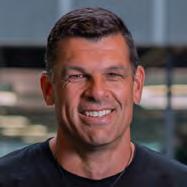

ees may prefer working in an office for structure and collaboration, while others will require flexible working to flourish. It’ll be challenging for both employers and employees to strike the right balance.
However, the businesses that thrive in the new world will be the ones paying attention to how the pandemic has affected their employees’ needs and working styles, and then adapting accordingly.
modified herbs and spices – we’re never really going to know the true GMO status, cos they’re secret.
Yup, we’re in safe hands.
Which brings me to now: What is the single most significant difference identified by Kiwi’s between Level 4 lockdown and Level 3? Access to fast food of course. No contest. Slam dunk.
Payment – contactless. Nutritional value – who cares?
Dirty dishes – none. Now that really is progress.
> BY CRAIG HUDSON
Craig Hudson is Xero’s managing director for New Zealand and the Pacific Islands.
Things won’t simply go back to normal, employers need to stay on top of what employees are demanding or they risk being left behind by their competitors.
The way businesses hire staff is also changing. Because of flexible working, many businesses are no longer limited to the prospects in their immediate vicinity.
In fact, we’ve just announced a new flexible work programme where employees can choose to work fully remote, from the office or in a hybrid model. If they have a
good internet connection, they can work from basically anywhere if they choose.
For people in Bay of Plenty, flexible work means they no longer have to move to Auckland or head overseas for a job opportunity.
Of course, for many professions, it’s not possible to offer flexible working for staff. But for who can, be sure to make careful considerations when deciding how to manage staff in the world of Covid-19. Don’t let memories of the ‘old world’ impact your policies or you’ll risk being left behind.
A Te Puke-based pet food producer is preparing for an influx in demand for its products as the pandemic puts pressures on global supply, national pet numbers increase, and market trends push consumers towards higher quality, wholesome pet food.
Local brand, Wishbone Pet Foods, entered North Island supermarkets this month, saying demand is extremely high and this has led them to recruiting more staff and making plans to expand their production lines, the company said in a statement.
Wishbone Pet Foods New Zealand Sales Manager, Paul Mansfield said their product has only been on supermarket shelves for a few weeks and already they’re being asked to supply more.
“We’ve just landed on the shelves of New World and Pak n Save and our future orders from the supermarkets’ keep increasing. It’s fantastic to see and shows just how high the
demand is out there for our gourmet products,” he said.
Wishbone Pet Foods exports its small batch, artisanal pet food to 15 countries around the world, all from its Te Puke factory.
Supporting local
“One thing this pandemic has proven to us all, is just how important supporting local is – not just for the business, but more importantly, the wider community.
“We partner with farmers around New Zealand to supply our pasture-raised, grass-fed beef and lamb, making sure we work particularly closely with Bay of Plenty farmers to keep
it as local as possible.”
New Zealand has the second-highest rate of pet ownership in the world. With 64 per cent of households owning at least one pet – with approximately 70 per cent of those owning either a cat or dog - our total pet population is nudging close to our human population, at 4.35 million.
According to Companion Animals NZ, this number continues to grow along with the rest of the world as New Zealanders seek comfort from their cats and dogs during the pandemic. This has placed pressure on pet food suppliers, which has recently made headlines in New Zealand for international shortages.
Demand from overseas is also increasing the demand for Wishbone Pet Foods products as pet owners become more aware of the importance of natural ingredients for their cats and dogs, creating a big market opportunity for food producers.
“Our overseas markets are looking for a natural product that they can trust. Every bag of Wishbone is made with eight superfoods and cooked at lower temperatures to preserve beneficial enzymes, vitamins, and minerals and that’s something we’re proud to be delivering,” said Mansfield.
“All our food is gently air-

dried in small batches. This ensures not only the nutrients in each ingredient are retained but it also seals in the real, wholesome flavours of our local ingredients. The process makes it more nutritious and appealing for our pets.”
A recruitment campaign to attract young talent is currently underway, allowing Wishbone and its co-brands to increase production and capture more opportunities. New
production lines are expected to be in place at the Te Puke factory by the end of this year. The Te Puke factory is the largest and most technologically advanced dry pet food plant in New Zealand.
During the pandemic, the company has also ramped up its support of animal shelters and has donated 3,000kg of pet food valued at $40,000 to Help Us Help Animals (HUHA) –enough to fill 12,000 bowls.
In 2012, Austrian daredevil Felix Baumgartner ascended in a helium balloon for two and a half hours, reaching “the edge of space” at an eye-watering height of 39km. Then, he jumped.

> BY JAMES HEFFIELD
Director of Bay of Plenty marketing and PR consultancy Last Word. To find out more visit lastwordmedia.co.nz or email james@lastwordmedia.co.nz.
he jump was broadcast on YouTube across the world. Falling from the stratosphere, he reached a record-breaking top speed of 1,357.64km/h, smashing the sound barrier, but spinning wildly out of control.
Felix survived, managing to regain stability and deploying his parachute after over four minutes of freefall. He landed – incredibly – on his feet, safely in New Mexico.
Why did he do this? To test the limits of human capability? Yes. To go down in history?
Yes. But first and foremost, he risked his life in this death-defying stunt... to sell energy drinks.
The jump was all part of the Stratos Project. Conceived by energy drink company Red Bull, whose tagline is “gives you wings” (see what they did there?), it will be remembered as one of the boldest PR stunts
ever undertaken.
Red Bull is renowned for its PR mastery. It’s widely reported that the company reinvest 1/3 of their profits back into marketing, with the Stratos Project alone costing $65 million. This is a staggering sum of money. So why do they do it?
Simply because PR, also known as public relations, is powerful. It is employed for any number of reasons: to save a celebrity’s reputation, make billions of dollars for a company, or even win an election. In its essence, it’s influence through storytelling. By predicting and understanding the public’s psyche, a person or organisation uses various communication channels to build a relationship with the public, and uses that to frame people’s perception of them.
This can take many forms – a social media trend such as
the Ice Bucket Challenge, a big stunt like Red Bull’s Stratos Project, brand partnerships such as New Zealand Rugby’s recent deal with INEOS, or celebrity affiliation, like when Jacinda Ardern picked up US talk show host Stephen Colbert from the airport when he visited New Zealand. She was interviewed by him on the drive home, and then invited him to a BBQ at her house with singer Lorde.
And the results speak for themselves. Eight million people watched Felix’s jump live and more than three million Tweeted about it. It made headlines across the world, turning Felix into an overnight celebrity. He set new records and contributed valuable research to the scientific community.
It’s the kind of publicity one can only dream of. But what made it a success? Money
PR… is powerful. It is employed for any number of reasons: to save a celebrity’s reputation, make billions of dollars for a company, or even win an election. In its essence, it’s influence through storytelling.”

obviously helped, but plenty of organisations have a lot of money and never achieve this level of buzz. So, what else?
Firstly, it was cool. Red Bull know their target audience: young people. Extreme sports and websites like YouTube are something this group gravitates towards.
It also had worth, providing real, useful research into the effects of space travel and extreme environments on the human body. For even the most sceptical of people, they can’t argue with those real-life contributions.
Next, they hit the media sweet spot of doing the “first,
fastest, highest”. News stories thrive off these kind of headlines and what makes a story stand out. It was also exceptionally visual, lending itself perfectly to TV, online and print.
Finally, it was bold. Red Bull literally shot for the stars. It was captivating, brave, full of drama, and inspiring. Who could turn their heads away from that?
While we don’t all have Red Bull’s budget, we can still embody these principles when diving into our own PR journey. In any circumstance, we should understand our audience and tap into what
makes them tick. We can also do something of worth, giving back to our community and contributing to the world, as well as looking into what’s new and innovative, even if just on a small scale. And we can be bold, setting high standards for ourselves and not settling for the mediocre. By investing in PR, we not only raise awareness, but we can control the narrative. PR attracts media attention, builds relationships, and persuades people. When done right, you could still be remembered decades later. So, are you ready to take the leap?

The most recent lockdown has caused much uncertainty for many employees around their job security. With Auckland only just breaking free of level 4 and Delta spreading into the Waikato (a little too close to home) this has caused many to wonder, can they cope through another lockdown on a wage subsidy?
Many have taken the lockdown break to rethink what they are doing and left many considering making a move to another role.
There are definitely going to be some sectors effected more than others through covid lockdown, but the trend is continuing with many businesses busier than ever, unable to keep with up with demand and growth, thus requiring more staff.
With 1,629 roles currently advertised on trade me
throughout the Bay of Plenty, it truly is a candidate-driven market.
With the latest figures due to be released from Ministry of Social Development it will be interesting to see, once published, what the lockdown effect has been on the region in terms of unemployment.
In initial reports, it was said that the increase was near on 680 people from across the region during our level 4 lockdown. Perhaps add to that the additional people now wishing to move from Auckland and

there may be enough to create competition for roles.
Need for diversification
Candidates looking for work may need to diversify and try
> BY KELLIE HAMLETT
Talent ID are Recruitment Specialists and can support you through your recruitment process. Please feel free to talk to us about this by calling 07 349 1081 or emailing kellie@talentid.co.nz
new industries or roles. Often understanding that many skills are transferable, employers and employees alike need to value experiences when considering roles or candidates. Although talent is in hot
Whilst having the right skill set is important, having the right attitude and trainability can be just as powerful in an application.
demand, employers realise the value of hiring for fit, and aren’t being drawn into the hiring based on skills alone. With compliance costs rising, employers can’t afford to make costly hiring mistakes.
Whilst having the right skill set is important, having the right attitude and trainability can be just as powerful in an application.
The seven most looked for skills on Careers NZ relate to: positive attitude, communication, team work, self-management, willingness to learn, problem-solving skills and resilience. This is all considered by the employer along with the skill and knowledge base of a candidate. That being said, the pool is still small.
For employers, it’s a tough candidate market, roles are taking longer to fill and lack of resource inhibits a businesses ability to grow. We’ve seen a lot of diversification, streamlining of systems and processes and thinking outside of the box to navigate through these unusual times.






